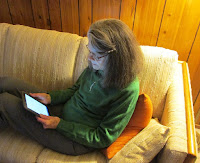A couple of years
ago I bought a Nook e-reader from Barnes &Noble. This has opened up a new
world of RV reading—partly good, partly bad—for me.
RV space is
extremely limited, and that’s a problem for anyone who reads. Even a few
paperbacks can take up space that is needed for something else. The Nook is
ideal for RV travel. I can load many books on it—a few science books for
reference or for bringing my knowledge up to date, a couple of current
mysteries, some novels, and a couple of classics I’ve always meant to read.
Though many ebooks are available for purchase
from Barnes &Noble and other sources, that option can get expensive.
Fortunately, I can also check out free ebooks and magazines from my local
library. Though they must be returned, like any library books, the returns can
be done online.
At times the
lighted screen of the Nook helps enormously. Even the amount of brightness is
adjustable. As a result, while my vision is poor, if we are boondocking and limited
to only a low light level I can still read. That isn’t always true for books on
paper.
Of course, if I
should lose or damage the Nook, I may lose an entire library. Supposedly Barnes & Noble can
easily replace lost ebooks I have bought from them. That’s a bit scary, and I
have not yet tested it.
I also have some
doubts about just how much I learn or retain from ebooks. Studies of reading
retention from ebooks and traditional books have had mixed results, though in
the last few years ebooks have seemed more acceptable to students and teachers,
as would be expected. (Ten years ago I thought “kindle” was only a verb. Today nearly everyone knows what a Kindle is.)
Nevertheless, some studies
have shown greater retention from solid books that demand an interaction with
paper, type fonts, and other characteristics. Much research is needed in this
field.
My own experience
bears this out. I have read many ebooks since retiring, both to fill out my
“bucket list” and for casual enjoyment. Though the serious reading (including a
lot of Tolstoy) has been pleasurable, and the built-in dictionary has helped
with comprehension during reading, I find afterward that I haven’t retained a
great deal from it. My impression is that reading the same books in a
traditional paper format would have been more productive. I could have
underlined portions of the text, written comments in the margins. When I look
at books I read many years ago, just seeing my additions to them recalls a
great deal. That may be possible with ebooks (it’s possible to highlight
passages and add comments, but inconvenient). I haven’t made the effort, though.
For me, the technology is too new. Younger readers may find it easy to handle,
and won’t care about books on paper. (What a terrible thought! I hope I
don’t live long enough to see that
happen.)
Casual reading is
another matter. If I don’t remember all the details of a murder mystery, it
doesn’t matter. In fact, I may be able to reread a book in a few years when I
don’t recall whodunit! It’s an unexpected bonus of aging.
So, which mode of
reading is better? As with so many things, it all depends. During travels in
the RV, I am grateful for the Nook. During time at home I still tend to
accumulate books printed on paper and add them to the library I’ve built since
childhood. During many moves around the country over the years, and a major
downsizing in 2005, I have ruthlessly cut down on that library, but it grows
back as quickly as kudzu. And, many of those books are old friends, treasures
that I have simply packed up and taken with me. Perhaps in time I will have a
Nook library of favorites also, but it hasn’t happened yet.
